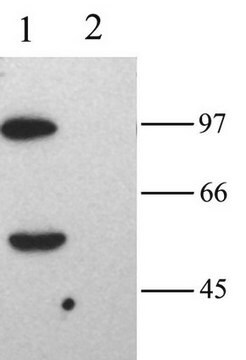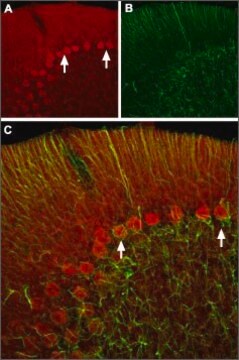MAB5596
Anti-HCN2 Antibody
culture supernatant, Chemicon®
Synonym(s):
Hyperpolarization-activated and cyclic nucleotide-gated channel 2
About This Item
Recommended Products
biological source
rat
Quality Level
antibody form
culture supernatant
antibody product type
primary antibodies
clone
monoclonal
species reactivity
mouse, rat
manufacturer/tradename
Chemicon®
technique(s)
immunohistochemistry: suitable
western blot: suitable
isotype
IgG1
NCBI accession no.
UniProt accession no.
shipped in
dry ice
target post-translational modification
unmodified
Gene Information
mouse ... Hcn2(15166)
rat ... Hcn2(114244)
Related Categories
Specificity
Immunogen
Application
Neuroscience
Ion Channels & Transporters
Immunohistochemistry on rat and mouse retina.
Optimal working dilutions must be determined by end user.
Physical form
Storage and Stability
Legal Information
Disclaimer
Not finding the right product?
Try our Product Selector Tool.
Storage Class Code
10 - Combustible liquids
WGK
WGK 1
Flash Point(F)
Not applicable
Flash Point(C)
Not applicable
Certificates of Analysis (COA)
Search for Certificates of Analysis (COA) by entering the products Lot/Batch Number. Lot and Batch Numbers can be found on a product’s label following the words ‘Lot’ or ‘Batch’.
Already Own This Product?
Find documentation for the products that you have recently purchased in the Document Library.
Our team of scientists has experience in all areas of research including Life Science, Material Science, Chemical Synthesis, Chromatography, Analytical and many others.
Contact Technical Service






